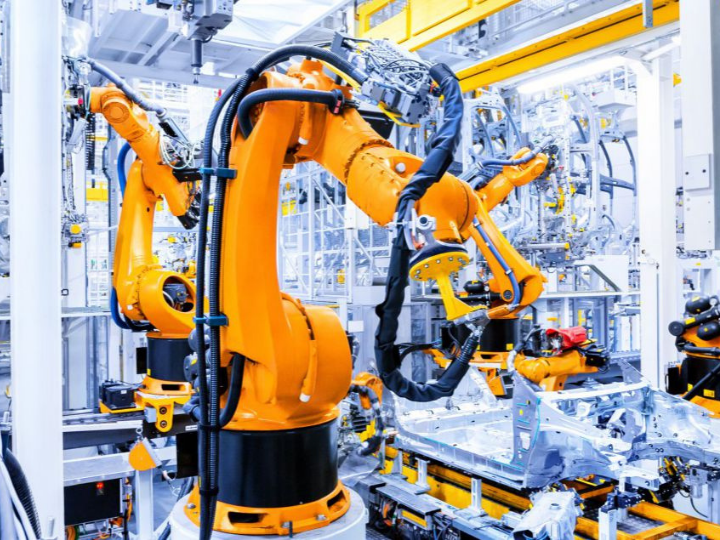by Francisco Betti and Ian Cronin*
COVID-19 has given the world a sharp reminder that manufacturing and production sectors – and their enabling supply chain ecosystems – remain the most real and significant force in the global economy.
Before COVID-19, many in the developed world believed that our digital connectivity made us the global leaders in self-sufficiency – after all, what couldn’t we order online from the comfort of our own homes? However, when simple necessities like toilet paper and soap disappeared, not only from our online shopping baskets but also from our local grocery store shelves, the world began to realize how critical resilient supply chains are.
We need an engine that can power a global recovery and help mitigate the impacts of future shocks to our global systems. By supporting manufacturing and production ecosystems to become more resilient, sustainable and inclusive, we can enable manufacturers and their ecosystems to become the driving force behind a new wave of booming global economic and social prosperity.
The engine block: Activating new operating and business models
Those familiar with the make-up of a car engine will know that the engine block provides the structure on which almost everything else is built. COVID-19 has made it all too clear that manufacturing’s current foundational structure has several underlying design flaws that put the sector’s workforce, customers and the environment at large at extreme risk to global disruptions.
Actions by industry and governmental leaders cannot only include in-step improvements or incremental changes. The entire sector needs a foundational shift to rethink not only what we do, but how we do it.
While that notion may seem daunting, COVID-19 has already presented the blueprint for those changes. The global pandemic has necessitated creative thinking from manufacturers around the world, and in doing so, new business and operating models built on resilience and sustainability have emerged to manage a nearly unprecedented level of disruption to global value chains.
Royal DSM and VDL Groep exemplified this type of needed operating and business model innovation when, in September 2020, they announced a joint venture to establish the first permanent production of critical facemask components in the Netherlands. In doing so this venture meets the urgent need to diversify the global production and supply chains of personal protective equipment at scale by reducing dependency on a small number of international sources.
There is also an increasing need for more visibility and sustainability across those value chains to accelerate carbon neutrality to ensure long-term viability.
The turbocharger: Capitalising on the power of 4IR technologies
Accelerating the adoption of critical 4IR technologies can, just like your car’s turbocharger, increase the efficiency power and performance of manufacturing, and accelerate our recovery from this global pandemic. Also just like a turbocharger, technologies like industrial IoT, additive manufacturing, cloud-based analytics and predictive maintenance can be enormously beneficial, but they won’t do anything for you if they aren’t fully integrated into your existing systems.
While undergoing such a 4IR transformation seems like an almost insurmountable task for many manufacturers, it is critical for companies to understand that they are not alone in this effort. The first step for any company is to understand their comparative position along the digital transformation journey – after all, it’s hard to know where you can go if you don’t first know from where you are starting.
New global benchmarking tools like the Smart Industry Readiness Index (SIRI) empower companies to make apples-to-apples comparisons with similar manufacturers around the world and better understand which technological undertakings will allow them to keep pace with – or move ahead of – their global competition.
Manufacturers can also gain valuable insights and inspiration into how they can actually execute their technology adoption goals by looking to “lighthouse” examples of companies that have set themselves apart and represent a beacon of possibilities. These best-in-class factories can give aspiring companies tangible examples of how factories can scale multiple technological use-cases and maximize their return on Fourth Industrial Revolution investments.
With multiple Lighthouse sites in the Global Lighthouse Network, Johnson & Johnson represents an amazing case example of the growth, sustainability, resilience and innovation potential that can be unlocked when an organization fully commits to a digital transformation journey. By ensuring that the effort to adopt and integrate 4IR technologies had buy-in at every level of the organization, Jonson & Johnson has been able to generate enormous impact across their entire network of manufacturing facilities.
The fuel & oil: An upskilled workforce and data-driven insights
Just like an engine can’t run without fuel, manufacturing is equally dependent on people. By putting people at the centre of any effort to transform or accelerate global manufacturing and industry – sectors that account for more than 16% of global GDP and more than 23% of global employment – we can foundationally shift one of the pillars of the world’s economy and provide an example that would be impossible for other sectors to ignore. It is critical that the global manufacturing community take three critical actions.
First, understand the future of skills in manufacturing. Leaders must identify the essential manufacturing skills of today and tomorrow to help prepare the future of work in manufacturing.
Second, upskill and reskill our current workforce. As job profiles change, it is critical that we not lose the expertise of the sector’s existing workforce, and instead upskill that talent to taking advantage of open-sourced reskilling platforms.
And finally, attract new talent. New technologies are transforming what it means to work on a factory floor, and industry players must collaborate to shift the “dull, dirty, and dangerous” perception of manufacturing job profiles to attract a new generation of leaders.
And if people are the fuel of this global engine, then data, or more accurately, the insights that manufacturers can derive from their data systems, is the oil that keeps the entire system running smoothly. With today’s manufacturing systems, companies have access to massive amounts of data – the hard part is operationalizing it. By leveraging emerging data analytics systems, manufacturers can maximize not only the efficiency of their physical assets but also the effectiveness of their workforce.
Companies are now seeing the need to directly engage in efforts to upskill the broader workforce in their communities. Whether through Stanley Black and Decker’s engagement with the Business-Higher Education Forum in Connecticut to develop new pathways to digital careers in manufacturing, or Rockwell Automation and ManpowerGroup launching the Academy of Advanced Manufacturing – an upskilling training program for US military veterans – companies are taking significant steps to ensure people are ready for the jobs of tomorrow.
The pit crew: multistakeholder collaboration
Just as the pit crew keeps all aspects of a race car ready for competition, multistakeholder collaboration efforts that bring together private sector players alongside government, academia and civil society stakeholders will allow this engine to adjust and adapt into the future.
The challenges inherent in our current global systems are intimidating in their size and scope. Most of these challenges are so massive and embedded, in fact, that no one company or even government could hope to address them on their own. By working together on these issues, however, there is an enormous opportunity to create a win for companies, governments, and most importantly, people, that no single stakeholder group could accomplish on its own.
For manufacturing sectors, this can begin by identifying new, pre-competitive, opportunities for collaboration to unlock untapped value pockets. By demonstrating how this level of collaboration can create new value for everyone in a manufacturing ecosystem, we can create a sector that is more innovative and agile, and capable of adapting to the challenges of today, as well as those still beyond the horizon.
Such a collaborative ecosystem emerged out of necessity in the early days of the COVID-19 crisis. In the Spring of 2020 we saw leaders from the additive manufacturing sector like HP Inc., Desktop Metal and Oerlikon – direct competitors in some cases – come together to support a united front to address shortages and rising demand triggered by COVID-19, and to better help efforts that protect the lives of those impacted by the global pandemic.
There are obviously many other parts that go into making an engine work, but with these four pieces in place, manufacturing sectors can help power a more sustainable and inclusive future.
*Head of Shaping the Future of Advanced Manufacturing and Production, World Economic Forum and Project Lead, Future of Advanced Manufacturing and Production System Initiative, World Economic Forum
**first published in: www.weforum.org




 By: N. Peter Kramer
By: N. Peter Kramer
